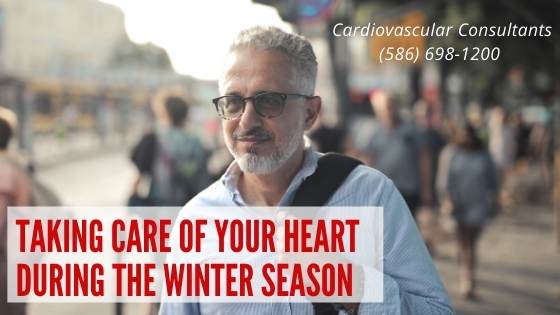As the weather gets colder, staying healthy is equally important. People with heart disease are at increased risk during the winter season. People are more likely to become sick during the winter season as compared to other times of the year. Winter also creates risk factors for respiratory diseases and other highly contagious viruses.
Risk factors for Heart diseases
- High Blood pressure
- High Cholesterol
- Cigarette smoking
- Diabetes mellitus
- Unhealthy lifestyle and physical inactivity
- Obesity

Why are heart attacks (cardiac arrest) common during the Winter?
The work of the Sympathetic Nervous system increases during the winter season causing narrowing of vessels or vasoconstriction. Due to this narrowing, the blood flow is decreased and the heart has to work extra hard to pump blood and keep the body temperature maintained. The winter wind causes the body to lose heat more quickly. The cold weather makes it difficult for the body to maintain the temperature. This causes the body to lose heat quickly which leads to hypothermia and damage to the muscles of the heart.
There is an increase in strenuous physical activity to combat the cold. Also, emotional stress due to the winter season increases the risk of heart attack and/or stroke.
Another important risk factor during the winter season is that the oxygen density in the atmosphere becomes low during winter. This causes an increased oxygen demand by the heart. Thus, in addition to the narrowing of the vessels, this reduced amount of oxygen reaching the heart causes a demand-supply mismatch leading to a heart attack.
Are there any warning signs and symptoms of a heart attack?
Severe chest pain that is unbearable and radiating to the left shoulder, neck, and left jaw is the most common symptom of a heart attack. Other symptoms are difficulty breathing, swelling in the legs, early fatigue, increased heart rate, nausea, and weakness. Symptoms may be different in men and women.
Tips to stay healthy during the winter season
Staying healthy helps you avoid getting sick during the winter seasons. Some of the tips to help beat the winter illness are:
- Eat healthy winter food
Hot and healthy meals that keep the body warm are one way to keep the immune system strong to fight the winter. Since hot foods are chosen to keep our bodies warm, it is important to make sure we choose heart-healthy meals. Winter vegetables like broccoli, beetroot, cabbage, pumpkin, cauliflower, potato are healthy options. Soups and stews are good winter dishes for a heart-healthy meal.
- Routine exercise
Cold weather and less daylight make it difficult to stick to routine exercise. Exercise is very important for a healthy heart and also for overall physical and mental health throughout the winter months. Daily habits like taking a 10 to 15 minutes walk, or exercising indoors via online exercise classes make a difference in the long run.
- Quality sleep routine
Enough good quality sleep is important for good physical and mental health. Most adults require 7 to 9 hours of good quality sleep. Sleep deprivation is linked to the development of various heart conditions like High Blood Pressure, Diabetes mellitus, heart diseases, and stroke.
Some tips for a healthy sleep pattern are:
- Regular fixed sleep hours – bedtime and wake-up time at the same time each day.
- Avoid heavy meals, caffeine, nicotine, or alcohol in the evening.
- All screens like iPads, phones, and TV should be put aside at least 30 to 60 minutes before going to sleep.
- Healthy sleep environment – warm bedding, hot water bottle, and avoidance of any distractions.
- Relax – a hot shower, meditation before going to sleep.
- Reduce stress
Stress can affect the body at any time of the year. Stressors like rising bills to keep the house warm, or illnesses preventing progress at work can pop up across winter. Relaxing activities like listening to music, reading, taking a hot bath, a short walk help calm the mind and help with the changes experienced in winter.
- Stay connected
COVID-19 lockdown period has taught us how important social connection is for our well-being. Winter can be difficult for those who are vulnerable. Family members, neighbors, or friends who are more vulnerable during the winter season should be carefully looked after to make sure they are warm.
- Prevention is always better than cure
Winter is also known as the flu season. Moreover, since the COVID-19 has been showing increased infectivity during the winter season, certain steps should be followed to avoid getting infected like:
- Regular hand washing for at least 20 seconds with soap and water.
- Don’t skip your usual medications
- Eat well, regular exercise, and good sleep to keep your immune system strong.
- Stay Warm
It is important to stay warm both inside and outside the house. Winter can trigger new symptoms or make the symptoms of heart disease even worse. Things to be kept in mind are:
- Keep your room temperature at around 18 degrees and avoid any heat escape.
- Keep yourself active even when you are inside.
- Wear lighter clothing layers that help trap warm air than one bulky layer.
- Put on a hat, scarf, and gloves to prevent further heat loss and keep yourself warm.
- Keep your bed warm by using an electric blanket/hot water bottle.
- Avoid alcohol as even if it makes us feel warm, it is actually drawing heat from the vital organs.
- Help yourself
Only you can identify and can explain your symptoms. If you find any difficulty in your chest or surrounding areas, don’t delay in reaching the hospital for treatment.
References
- Heart Foundation NZ. 2021. 7 ways to stay healthy this winter. [online] Available at: <https://www.heartfoundation.org.nz/about-us/news/blogs/how-to-take-care-of-your-heart-this-winter> [Accessed 27 November 2021].
- Munsonhealthcare.org. 2021. 5 Ways to Treat Your Heart Right this Winter. [online] Available at: <https://www.munsonhealthcare.org/blog/5-ways-to-treat-your-heart-right-this-winter> [Accessed 27 November 2021].




